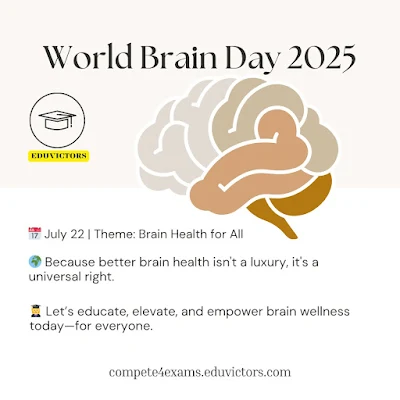World Brain Day: A Student’s Guide to Brain Health #compete4exams #July22 #eduvictors
World Brain Day: A Student’s Guide to Brain Health
Every year on 22 July, people worldwide unite to observe World Brain Day. This event underscores the importance of caring for our brains, raising awareness about neurological disorders, and advocating for equitable access to healthcare. For students, understanding how to care for your most vital organ is not just a health issue—it is essential for academic success and lifelong well-being.When Did World Brain Day Begin?
The idea of World Brain Day originated at the 2013 World Congress of Neurology, where the World Federation of Neurology’s Public Awareness and Advocacy Committee proposed dedicating a specific day to brain health. The proposal received formal approval from the WFN Board of Trustees the following year, and the inaugural World Brain Day was observed on 22 July 2014. That date was selected to align with the Federation’s original founding on 22 July 1957, symbolically connecting past achievements in neurology with ongoing efforts to protect mental and neurological health.
The 2025 Theme: Brain Health for All Ages
Each year, World Brain Day adopts a new theme to steer its global campaign. For 2025, the selected theme is Brain Health for All Ages. This emphasises the importance of safeguarding and enhancing brain function from before birth through later life. By presenting brain health as a lifelong dedication, the campaign aligns with both the United Nations Sustainable Development Goals and the Intersectoral Global Action Plan for epilepsy and other neurological disorders (2022–2031).
Key messages for World Brain Day 2025 include:
Awareness: Tackle stigma and promote early detection of neurological conditions.
Education: Provide students, caregivers, and professionals with the latest evidence and practical training.
Prevention: Emphasise healthy lifestyle habits—good nutrition, vaccination, blood-pressure management, and stress reduction.
Access: Support affordable, high-quality neurological services and rehabilitation, especially in underserved areas.
Advocacy: Campaign for policy reforms, increased research funding, and stronger healthcare infrastructure globally.
By rallying around these five pillars, students and educators can actively contribute to making brain health a shared global priority.
Why Students Should Care About Brain Health
Our brains are the engines behind every thought, memory, and movement. For students, brain health directly affects:
- Concentration and focus during lectures and study sessions.
- Memory retention when learning new concepts or revising for exams.
- Emotional well-being and the ability to handle stress during assignment deadlines.
- Physical coordination in sports and everyday activities.
According to the World Health Organisation, brain health includes cognitive, sensory, emotional, behavioural, and motor functions that enable us to reach our full potential, regardless of any disorders. When students adopt brain-friendly habits early, they lay the groundwork for academic success and a more fulfilling life beyond school.
How Students Can Boost Their Brain Power
Maintaining optimal brain function doesn’t require drastic measures. Small, consistent habits make all the difference:
Prioritise sleep — aim for 7–9 hours of quality sleep each night. Sleep supports memory consolidation and helps the brain clear toxins that build up during the day.
Eat brain-healthy foods — include plenty of fruits, vegetables, whole grains, nuts, and oily fish. These foods provide antioxidants, healthy fats, and vitamins that are linked to sharper thinking and an improved mood.
Stay physically active — engage in at least 150 minutes of moderate exercise per week. Activities such as running, cycling, or brisk walking increase blood flow to the brain, thereby enhancing cognitive functions like learning and creativity.
Practice mindfulness and stress reduction — simple breathing exercises, short meditation sessions, or yoga can lower stress hormones that interfere with memory and concentration.
Keep your mind engaged — swap some screen time for puzzles, reading, learning a musical instrument, or playing chess. Mental challenges build neural pathways and foster a growth mindset.
Build social connections — strong friendships and group study sessions not only make learning more enjoyable but also stimulate neural circuits tied to motivation and emotional resilience.
Protect your head — always wear appropriate helmets for cycling, contact sports, or any activity with a risk of head injury. Even a minor concussion can have lasting effects on cognitive function.
By weaving these habits into your daily routine, you’re supporting your brain’s health today and protecting it for the years ahead.
Integrating Brain Health into Student Life
Schools and universities can promote brain health by:
Offering workshops on nutrition, sleep hygiene, and stress management.
Designing study-friendly campuses with quiet zones, green spaces, and comfortable rest areas.
Supporting peer groups that encourage healthy lifestyle choices.
Collaborating with student health services to provide brain-health screenings and advice.
Students can take the initiative by organising Brain Day events, sharing advice on social media, and inviting experts to speak on campus. Celebrating World Brain Day together builds community, raises awareness, and motivates everyone to take personal responsibility for their mental and neurological well-being.
Looking Ahead: A Lifelong Commitment
World Brain Day 2025 reminds us that brain health is a continuous journey, not a one-time milestone. For students, investing time and effort in healthier sleeping patterns, balanced nutrition, regular exercise, and stress management will enhance academic success and overall wellbeing. As you move from the classroom to career and beyond, healthy routines developed now will support you for many years to come.
Join the global chorus of students, educators, and healthcare professionals to champion the theme 'Brain Health for All Ages.' Whether you share a study tip, lead a mindfulness session, or simply take a moment to unplug and rest your mind, every action counts. After all, every brain matters—especially yours.
👉SEE ALSO:




No comments